Cooking professionally is less about having the “right” degree or going to the “right” school, and more about having the “right” knowledge and skills.
Some cooks and chefs choose to gain those skills on the job. But for many, attending a culinary training school for chef training can prove to be a more effective way to get the education they may need in a shorter timeframe and in a more organized fashion.
So what kind of training do you need to work as a professional cook or chef?
The Culinary Training You Need To Be a Professional Cook
Not all careers as a professional cook or chef require the same skills. A personal chef working alone, for example, won’t need the same delegation and leadership skills as an executive chef who runs a large kitchen. And a pastry chef will need in-depth baking and dessert knowledge that a line cook may not need.
But here are some of the skills most chefs must be well-trained in if they’re going to have a shot at cooking professionally.
Good Hygiene, Safety, and Sanitation Standards
Without solid training in food safety and sanitation, no aspiring chef will get far. A clean kitchen and workstation are important for efficiency, but they are also crucial for keeping your food safe to eat.
Effective safety training includes hot and cold holding times and storage temperatures for different foods. It also includes safe cook temperatures for different proteins and storage methods in the walk-in.
Raw poultry, for example, should always be stored on a shelf below any other protein, due to its higher cook temperature than beef, fish, or pork. If a chicken drips down onto a steak, that steak won’t be cooked to a high enough temperature to kill any bacteria from the chicken and prevent illness.
Some states and organizations require that cooks be ServSafe certified, to prove they have this training. Even where it’s not required, it’s a good credential to have! Other food handler cards and certifications may exist in your state, so check your local laws to know for sure.
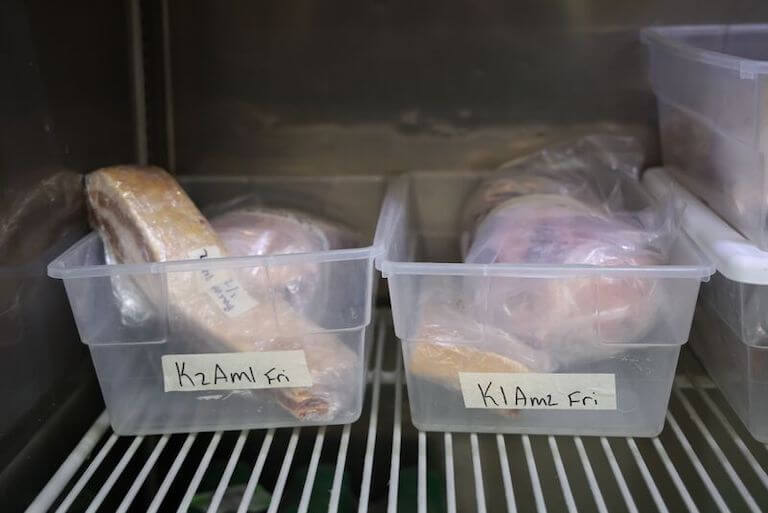
Proper storage, naming, and dating are crucial for food safety.
Safe and Efficient Knife Skills
Before the cooking comes the chopping. The breaking down the large cuts of meat. The chiffonades, juliennes, and the dices.
Prep is a huge part of cooking professionally, and that means a cook must be well-trained in the right way to hold a knife, when to use different knives, the various types of cuts, and the right way to get uniform pieces of protein, herbs, aromatics, and proteins.
“You know what this knife is? This is your Ford F-150. This thing is going to get you back and forth. Is it a Damascus Steel knife? No. It’s not a Range Rover. You’re not overpaying. You’re paying the right amount of money for a quality tool that’s going to get the work done every day.”*
John Percarpio, Escoffier Chef Instructor, discussing the chef’s knife included in the Escoffier Culinary Toolkit
Working the Equipment
A commercial kitchen has many of the same basic tools as a home kitchen…but on a much larger scale. Instead of a simple cooktop with four burners, there could be six or even eight. Instead of a countertop stand mixer, there could be a 40-quart or even an 80-quart floor mixer. Then there’s the equipment you usually won’t find at home, like a flattop or a deep fryer.
A professional cook usually knows how to use all of these. As they progress through their careers, they may even learn how to do some basic maintenance on them. And they’ll certainly get familiar with cleaning them.
This kind of training often happens on the job, although it can also begin in an on-campus culinary school program or an industry externship.
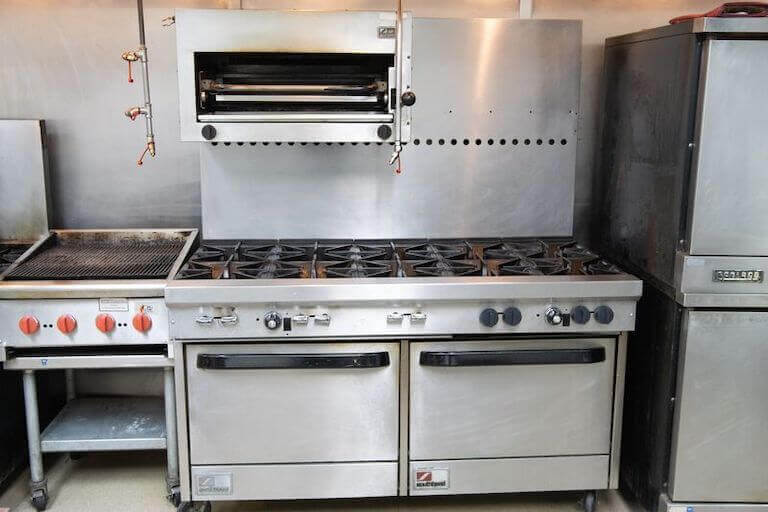
It’s not all that different from the oven and stovetop you may have at home!
Cooking Fundamentals
How do you create a perfect sear on the outside of a steak, while keeping the inside juicy and tender? How can you roast an entire chicken so its irregular shape cooks evenly? When is the best time of year to use fresh tomatoes, and how do you go about preparing an artichoke?
These questions get into the core of “how to cook.” And clearly, no one can cook professionally without this kind of culinary arts training.
This is an area where cooks and chefs continue learning and growing their culinary toolbox throughout their careers. But a solid foundation in the fundamentals is the best place to start.
The Principles of Flavor
Every dish is a balancing act. The right blend of rich umami and vegetal bitterness. A bit of acidity to brighten up the flavor and make the dish come alive. A hint of unexpected sweetness that lingers on the tongue.
There is so much to learn about flavor. Chefs aren’t guessing when they add a bit of this, a bit of that. They know what the dish needs more of, or where a flavor note needs balancing out. How do they know? From their culinary arts training. Individually tasting spices and other ingredients help build the palate. The knowledge and history you learn about each component can bring it all together.
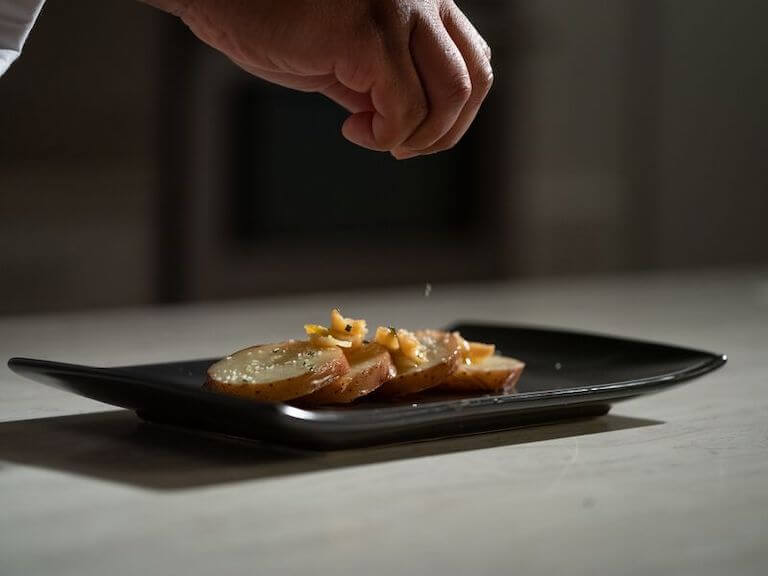
Salting a finished dish.
What To Look for in a Culinary Training Program
Do you have to attend culinary training school to start cooking professionally?
No.
But for many cooks and chefs—including many of the graduates of the Auguste Escoffier School of Culinary Arts—a formal program has proven invaluable in either getting their careers started strong or in filling knowledge gaps that have formed during their years in the industry.
As you assess a program for your own cook or chef training, here’s what you should look for.
A Focus on the Fundamentals
Many of the above topics will be touched on in culinary school. Knife skills, safety and sanitation, and training in flavor profiles should be included as part of the curriculum in any culinary training program.
Most Escoffier programs begin with a Culinary Foundations course that can get students started with these skills, which are then built further throughout the more advanced courses.
“If you have a great product and you don’t know how to treat it, you’re just kidding yourself…The technique is absolutely paramount.”*
Bob Scherner, Escoffier Boulder Executive Chef
Specialty Education To Meet Your Goals
Not all aspiring cooks or chefs have the same goals. Some may wish to become pastry chefs or bakers. For them, there are baking and pastry arts programs.
Others may be passionate about vegan or vegetarian cooking. A training program in plant-based culinary arts could help them explore exciting ways to turn fruits, grains, and vegetables into delicious and decadent dishes.
And for those who want to take a health-based approach to food, a degree or diploma in holistic nutrition and wellness could provide both the culinary training and the scientific knowledge they may need to get started.
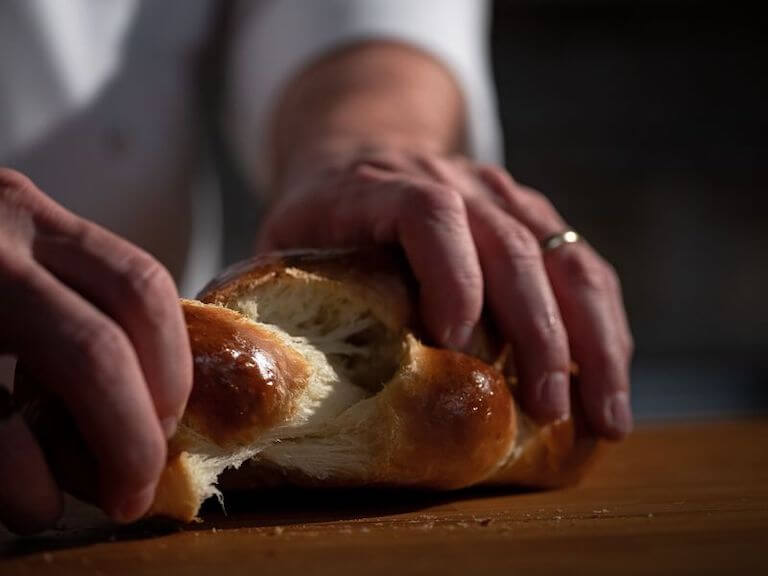
Perfectly baked challah bread
Expert Chef Instructors
A school is only as good as its faculty. A quality culinary arts training program should have top-of-the-field Chef Instructors who have the credentials, education, and experience to guide future cooks.
Among Escoffier’s Chef Instructors, you’ll find Certified Executive Chefs®, entrepreneurs, chefs from Michelin-starred restaurants, cookbook authors, a Master Baker, and more!
Meet Escoffier’s Chef Instructors!
- Chef Instructor John Percarpio talks about his passion for cooking on Escoffier’s The Ultimate Dish podcast
- Master Baker and Chef Instructor Colette Christian shares the importance of mentorship for young bakers
- Chef Instructor Steve Konopelski tells his unique story going from Broadway dancer to successful pastry chef
- Escoffier Executive Chef Bob Scherner shares his experience working for famous chef Charlie Trotter and the importance of great technique
- Author and Chef Instructor Albert Schmid shares somes of his passions, from cocktails to writing to cooking with cannabis
Business Education
Some cooks and chefs dream of opening their own culinary business—like a restaurant, food truck, or catering company. Others prefer to work for others. But regardless, some business acumen can only serve anyone cooking professionally.
At Escoffier, the business curriculum can cover topics like managing food costs and inventory, leadership and professionalism, and creating a business plan. These skills may help boost profitability, which keeps the entire kitchen running smoothly!
An On-The-Job Component
Professional training in cooking isn’t helpful if it’s only theoretical–it must be put into practice! This will typically happen when the student goes out to get their first industry job. But at Escoffier, students can bridge the gap from school to work a bit more smoothly with their hands-on industry externships.
These real-world externshipgive students the opportunity to work side-by-side with more experienced cooks and chefs, putting everything they’ve learned into practice.
“We start talking to you about your externship course really early in the process of becoming a student with us. We want to help you find what the right externship is for you based on your career goals and we help you to find those career goals early on, so you can understand what you want to do with your externship.”*
Patricia Souza, Escoffier Vice President of Careers Services
Accreditation
Not all culinary training offers the same level of academic rigor or a well-planned curriculum. A good way to ensure you’re getting a quality education is to look for accreditation.
Escoffier is an accredited institution, meaning it meets specific academic standards for culinary institutions.
Flexible Programs
Some culinary students have the option to attend in-person culinary school. Maybe their financial position allows for some time off of work. Or perhaps their work schedule lets them work nights and weekends while they attend school during the day.
But for others, spending most of the week in a kitchen classroom isn’t an option. For these students, an online program can be the answer. Escoffier pioneered the field of online culinary education, and today offers degree and diploma programs in culinary arts, baking and pastry, plant-based culinary arts, and holistic nutrition and wellness, all online with a hands-on industry externship!
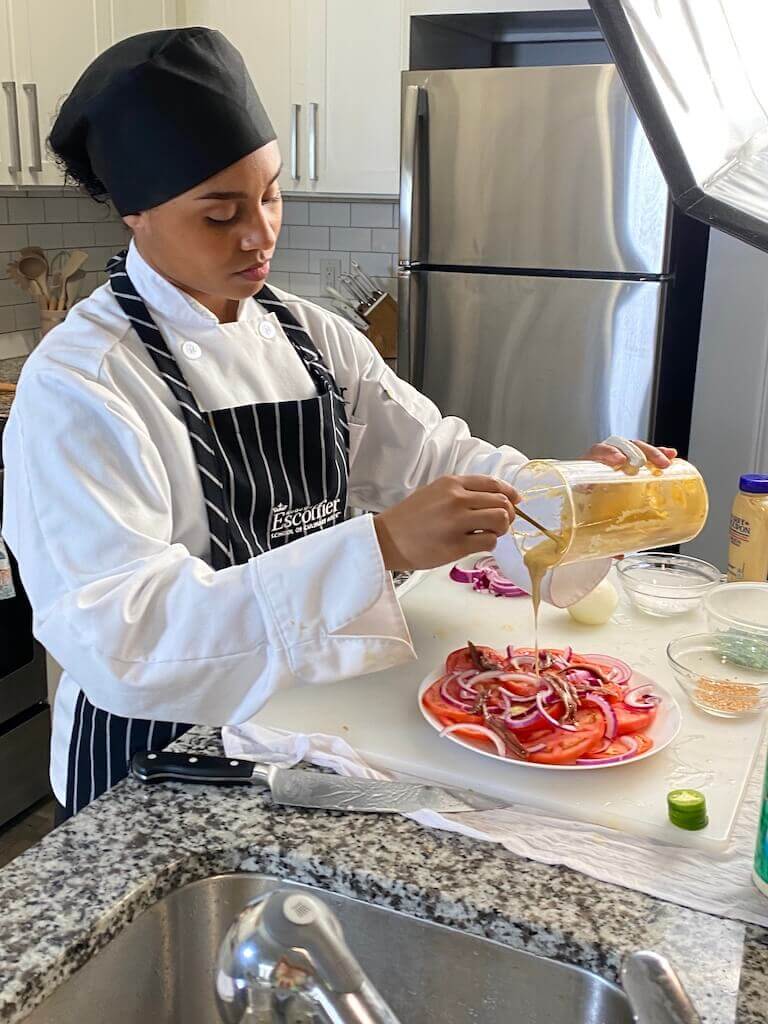
An online culinary arts student working on an assignment from her home kitchen.
Culinary School Is Just the Beginning!
Culinary training may start in school, but it will continue for years to come for cooks and chefs who are serious about reaching their full potential. Cooks can learn something new in every kitchen they work in, and from every chef they work for. Even after reaching the executive chef position, there may be more training necessary in specific techniques or new technology.
To take the first steps in training for a culinary career, contact Escoffier’s Admissions Department! Get answers to all your questions and start your career with the training you’ll need to succeed.*
Learn more about careers in culinary arts with these articles:
- What Chefs Look For When Hiring Culinary School Graduates
- Career Options for Culinary School Graduates
- The Difference Between a Cook and a Chef
*This information may not reflect every student’s experience. Results and outcomes may be based on several factors such as geographical region or previous experience.

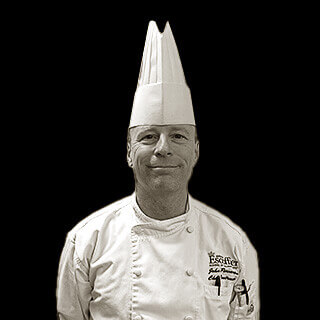 “You know what this knife is? This is your Ford F-150. This thing is going to get you back and forth. Is it a Damascus Steel knife? No. It’s not a Range Rover. You’re not overpaying. You’re paying the right amount of money for a quality tool that’s going to get the work done every day.”*
“You know what this knife is? This is your Ford F-150. This thing is going to get you back and forth. Is it a Damascus Steel knife? No. It’s not a Range Rover. You’re not overpaying. You’re paying the right amount of money for a quality tool that’s going to get the work done every day.”*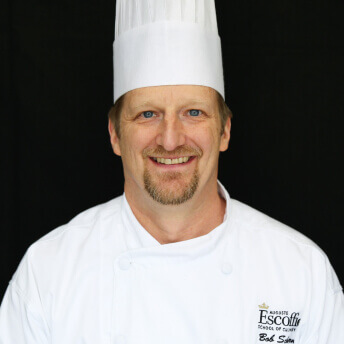 “If you have a great product and you don’t know how to treat it, you’re just kidding yourself…The technique is absolutely paramount.”*
“If you have a great product and you don’t know how to treat it, you’re just kidding yourself…The technique is absolutely paramount.”* “We start talking to you about your externship course really early in the process of becoming a student with us. We want to help you find what the right externship is for you based on your career goals and we help you to find those career goals early on, so you can understand what you want to do with your externship.”*
“We start talking to you about your externship course really early in the process of becoming a student with us. We want to help you find what the right externship is for you based on your career goals and we help you to find those career goals early on, so you can understand what you want to do with your externship.”*

